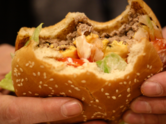Types of cravings and the deficiencies they indicate
TOI Lifestyle Desk | ETimes.in | Last updated on - May 5, 2024, 11:00 ISTShare fbsharetwsharepinshareComments (0)
01/7What do cravings indicate about our health?

Cravings are our body's way of communicating its needs. While they can sometimes be for indulgent treats, they can also signal deficiencies in essential vitamins and minerals. Understanding the types of cravings and the deficiencies they indicate can help you address nutritional imbalances and maintain overall health.
02/7Chocolate cravings


Chocolate cravings are one of the most common cravings, and they often indicate a magnesium deficiency. Magnesium is crucial for energy production, muscle function, and regulating mood. A study published in the Journal of the American College of Nutrition found that magnesium-deficient individuals were more likely to experience chocolate cravings. Adding magnesium-rich foods like nuts, seeds, and leafy greens into your diet can help reduce these cravings.
03/7Salty food cravings


Craving salty foods like chips or french fries may indicate a sodium deficiency. Sodium is an essential electrolyte that helps maintain fluid balance in the body and supports nerve and muscle function. A study published in the American Journal of Clinical Nutrition suggests that sodium cravings may be the body's way of trying to maintain proper electrolyte balance. However, it's essential to consume salty foods in balance, as excessive sodium intake can lead to high blood pressure and other health issues.
Read also: How smoking can effect your heart health
04/7Sugar cravings


Sugar cravings can stem from various deficiencies, including chromium, carbon, phosphorus, sulfur, and tryptophan. Chromium deficiency, in particular, is linked to increased sugar cravings. Chromium helps regulate blood sugar levels, and a study in the Journal of Psychiatric Research found that chromium supplementation reduced carbohydrate cravings in people with atypical depression. To combat sugar cravings, focus on consuming complex carbohydrates like whole grains, fruits, and vegetables, which provide sustained energy without the crash.
05/7Carbohydrate cravings


Craving carbohydrates like bread, pasta, or rice may indicate a nitrogen deficiency. Nitrogen is essential for synthesising amino acids, which are the building blocks of protein. A study published in the British Journal of Nutrition found that nitrogen deficiency led to increased carbohydrate intake in rats. To address carbohydrate cravings, ensure you're consuming enough protein-rich foods like meat, fish, eggs, and legumes.
Read also: 8 home remedies for sensitive teeth
06/7Meat cravings


Cravings for meat, such as chicken may indicate an iron deficiency. Iron is crucial for transporting oxygen throughout the body and maintaining energy levels. A study in the British Journal of Nutrition found that iron-deficient individuals were more likely to crave meat. If you're experiencing intense meat cravings, it's essential to add iron-rich foods like leafy greens and legumes into your diet.
07/7Ice cravings


Craving ice may also indicate an iron deficiency. This craving, known as pagophagia, is a type of pica—a condition where individuals crave non-food items. Anaemia, often caused by iron deficiency, is linked to pagophagia. Research published in the Journal of the American Board of Family Medicine suggests that chewing ice may help alleviate oral pain and inflammation associated with iron deficiency anaemia. However, it's crucial to address the underlying iron deficiency with iron-rich foods or supplements.













































































































closecomments
SIGN IN WITH
GoogleEmail